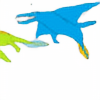HOME | DD
 Harry-the-Fox — Palaeoloxodon namadicus Size
Harry-the-Fox — Palaeoloxodon namadicus Size

#elephants #valley #narma #namadicus #pnamadicus #palaeoloxodon
Published: 2018-03-05 02:43:10 +0000 UTC; Views: 22808; Favourites: 251; Downloads: 152
Redirect to original
Description
WHOOPSIE! I think my bone-skewing attempts had a casualty; the tusks were, compared to its close relatives, too straight. That has been fixed.
Thanks to DenisetheTyrant for pointing it out.
Another favourite I've been looking forward to making for a long time!
Ever since it turned out the awe-insipiring "Songhua River Mammoth" (M. sungari) was in fact, not real, I began to wonder at the reason; if that skeleton was a frankenstein made from a mammoth that only reached 4.5 meters at the shoulder.... and some OTHER animal whose bones are so massive merely adding to a tiny animal makes it colossal.... what the hell was that OTHER animal?!?!?
I have a feeling it's this one.
While Palaeoloxodons (sometimes ironically called the "dwarf elephants" as a lot of them are tiny) tend to have many colossal species like Recki and Antiquus that already tower over most of the other proboscids, this animal manages to dwarf even them. And to make it absolutely clear, if M. sungari was real, it would be a LOT smaller than P. namadicus. They would have had similar shoulder heights.... but when we consider the mammoth would have been anatomically similar to the Steppe Mammoth, its impressive shoulder height would have partly been due to having extra-long front legs and a steeply sloping back....
Palaeoloxodon Namadicus on the other hand reached that size solely because it's just plain HUGE. According to Larramendi, it would have weighed 22 tonnes. Compared to that, the mighty Paraceratherium weighed 17 tonnes (not to mention, grew to much shorter shoulder heights despite being an animal specifically evolved to be tall).
Initially, I was reluctant to work on this majestic animal because it was only known from a few leg bones, and the two animals considered the best to infer anatomical proportions from (P. antiquus and P. recki) have major anatomical differences, I felt stuck. Then I decided to simply take the Larramendi skeletals of both animals and super-impose them over his Namadicus skeletal, distorting the shape until the limbs matched the position and size. The end result practically neutralized the differences of BOTH animals, and closely matched Larramendi's existing silhuette. Of course, a few differences remained, so I mainly erred to Antiquus as it was apparently more closely related to Namadicus, and sometimes cited as a possible ancestor (Larramendi on the other hand appeared to opt for Recki, I think because Namadicus had more slender bones for its size than Antiquus, but not so much Recki). The result I got was a bigger butt and a slightly thicker body and bigger head than what Larramendi suggested.. but I should stress most of the differences really weren't very noticeable. Overall I'm pretty confident that the animal would have been roughly the size and shape it was depicted as here, despite the lack of immediate remains.
Enjoy!
Related content
Comments: 188

👍: 0 ⏩: 1

👍: 1 ⏩: 1

👍: 0 ⏩: 1

👍: 1 ⏩: 1

👍: 0 ⏩: 1

👍: 1 ⏩: 1

👍: 0 ⏩: 0

👍: 1 ⏩: 0

👍: 1 ⏩: 1

👍: 0 ⏩: 1

👍: 1 ⏩: 1

👍: 1 ⏩: 1

👍: 0 ⏩: 0

👍: 1 ⏩: 1

👍: 0 ⏩: 0

👍: 1 ⏩: 2

👍: 0 ⏩: 0

👍: 0 ⏩: 0

👍: 2 ⏩: 1

👍: 0 ⏩: 0

👍: 1 ⏩: 3

👍: 0 ⏩: 0

👍: 1 ⏩: 1

👍: 1 ⏩: 2

👍: 0 ⏩: 1

👍: 0 ⏩: 1

👍: 0 ⏩: 0

👍: 1 ⏩: 1

👍: 1 ⏩: 0

👍: 4 ⏩: 1

👍: 0 ⏩: 1

👍: 1 ⏩: 2

👍: 0 ⏩: 0

👍: 0 ⏩: 0

👍: 0 ⏩: 1

👍: 0 ⏩: 1

👍: 0 ⏩: 1

👍: 0 ⏩: 0

Nice, even though I have a feeling it will be downsized in the future...
👍: 0 ⏩: 1

Thanks, and I honestly hope more of its skeleton can be retrieved to find out
👍: 0 ⏩: 1
| Next =>

















